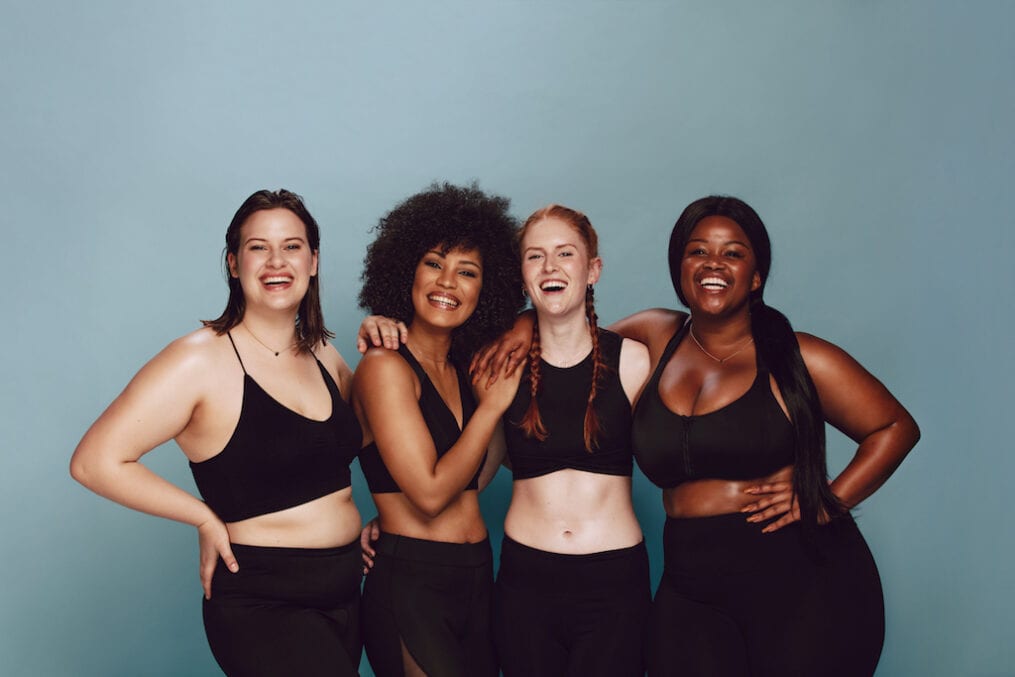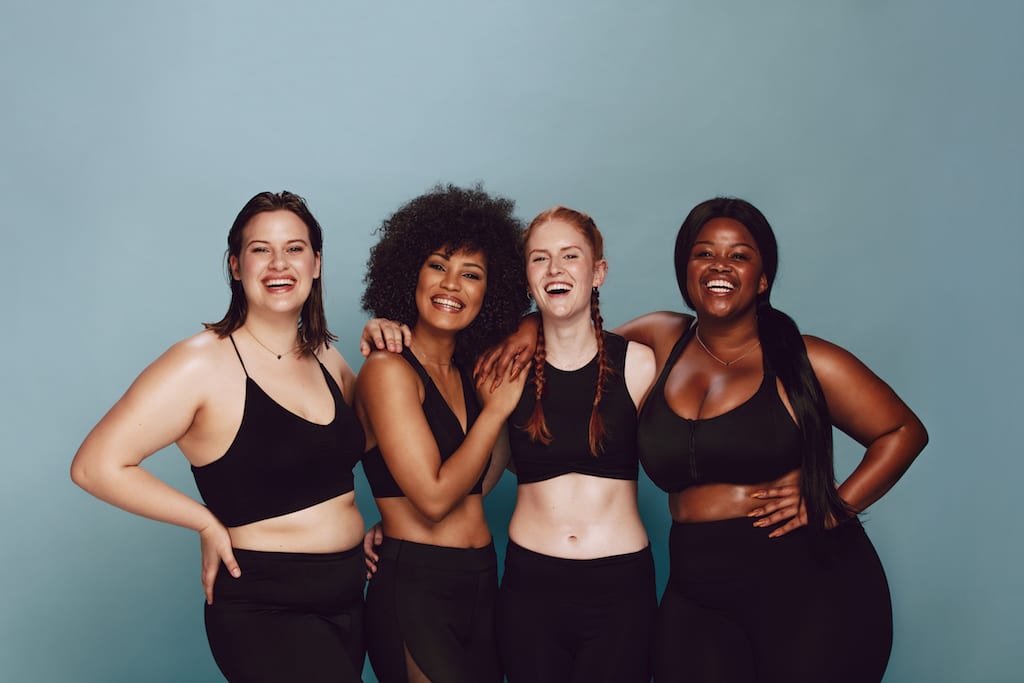How to be body confident

For most of us, our body is an integral part of our identity. Not just a thing that contains us but the thing through which we experience life and how other people see us. ‘How you walk and talk, how you express yourself and get dressed in the morning, all of that has to do with how you feel about yourself – physically and emotionally,’ says psychotherapist Holli Rubin. It’s why, sometimes, how we judge our appearance can impact our mood and confidence, and yet when body image causes anxiety, the issue isn’t our physical self, it’s years of being conditioned to believe certain shapes and characteristics are normal – valuable, even.
‘We’re told from an early age that the body is something to be shaped, and that the more conventionally attractive you are, the happier and more successful you’ll be,’ says mental health activist Natasha Devon. ‘It also has a feminist aspect. The easiest way to shame women is to comment on their body, because this is how we’ve been valued.’ That shame can be internalised so we barely register it, never questioning the validity of post-pregnancy snap-back stories, miracle weight-loss journeys and marvelling at makeovers, even though we know these standards – perpetuated by the media – can trigger anxiety.
It’s a pervasive problem: estimates from the British Social Attitudes Survey found that, when reflecting on their body image, 40% of women felt anxious, and 45% had felt depressed. And as we’re particularly vulnerable to developing negative body image during times of change, having a support network is crucial to help us to be more body confident. ‘Listening to the things friends and family like about us gives us positives to focus on,’ says Devon.
There are a few moments in life where we can be extra vulnerable to poor self-esteem. If any of the scenarios below apply to you, read our tips to help you be more body confident.
You’ve lost or gained weight
‘There are times where others see a change as an improvement but comments about it can be significantly impactful,’ says clinical psychologist Dr Helen Care. ‘We should never assume a person sees things the same way we do. And we never know how much of a person’s identity was tied in to how they looked before.’
When body shape – whether you’ve gained weight it or lost it – triggers negative body image or a disconnect, it can make seeing the naked self stressful, but research by social psychologist Dr Keon West found that mirror exposure therapy, where people spend time looking at themselves, can reduce anxiety and help us to be more body confident.
Devon also recommends changing up your social media feeds. ‘Diversifying shows us a whole range of people and helps us see the real normal.’
You’ve started seeing someone new
There’s something uniquely exposing about finding a new partner. ‘It’s especially true if you go into dating anticipating rejection,’ says relationships and psychosexual therapist, Dr Amani Zarroug. ‘If you’re already thinking you’re not sexy or lovable, you can distance yourself from people to avoid that pain.’
According to Zarroug, the times we feel most sexy are often outside the bedroom. ‘Think about moments when you’ve felt charming and witty – tapping into that can help you reconnect with your sex appeal. It has nothing to do with how you feel about your body, but the energy you get from that can transform itself into your body,’ she says.
Body image has a huge impact on your sexual self-esteem, because a sexual relationship isn’t just with your partner, but also with yourself. ‘If it’s negative, it can mean you struggle with being touched or feel self-conscious, which takes you out of the sexual experience and enjoying how you’re being touched, the temperature, the texture, what it feels like to be in the moment,’ says Zarroug.
To combat this, ‘focus on the parts of your body that you love, to change the narrative. It can be something as subtle as appreciating how soft your skin is, or something functional – “These are the legs that carry me from place to place.”’
You’ve had some health problems
A sudden change – after an operation or illness – can be one of the more complex areas of body image. ‘When a patient’s body changes because of a health issue, it can be followed by a period of grief,’ says Care. ‘You’ve survived something, but there are often changes to adjust to, and some patients grieve for the person they were and the loss of experiences they thought they might have.’
Those changes don’t have to be visible for it to trigger low body confidence, but Care says that when they are, patients often need to develop additional coping strategies. ‘How other people respond to you can be a challenge. A minority of people feel entitled to comment on, even criticise, appearance in others. Even when the majority of interactions patients have are positive, those odd, hurtful comments can be powerful and damaging.’
Care recommends practising one-sentence responses that either address comments or shut them down. ‘People say things or stare because they’re curious and don’t understand, and it’s worth planning for how to deal with that. Practise polite responses – hear yourself saying them – so you feel confident. This can also help you to avoid feeling pressured into oversharing if you’re caught on the hop. And give yourself permission to reject other people’s reactions. You’re allowed to not want to talk about it. You don’t owe anyone information on your body.’
Challenging that internal, critical voice and be aware of how you’re feeling day-to-day can help you to be more body confident over time. ‘Focus on the other aspects of your life: your achievements, interests and the people around you who build your confidence. Recognising all the other wonderful things about you can protect you from the impact of body image concerns.’
You’re pregnant or a new mum
Pregnancy is a time when many women feel liberated and comfortable in their physical selves. ‘People have talked about giving themselves permission for the first time to be free in their body,’ says Rubin. However, issues can arise because the changes to a woman’s body coincide with huge changes to her life. ‘There are all these rules, these images to live up to of what the perfect pregnancy or new motherhood looks like,’ says Rubin.
Women are particularly vulnerable if they have had issues with self-esteem in the past or feel at odds with how their body is changing. ‘People have talked about feeling fat as opposed to feeling pregnant,’ says Rubin. It can leave them uncomfortable because it’s not the body they’re used to seeing themselves in, leading to around 41% of women feeling more negative about their body image after pregnancy than before.
Some of the symptoms of poor body image can present as bigger issues at this time, especially when it comes to bonding with the new baby. ‘If mum is focused on her physical self or emotional self only, she’s not in the right presence of mind for the baby and it can have a real impact in those early days.’
But, ultimately, the right support can help you to be more body confident. ‘Connect with people, have those conversations either through groups or through partners or parents, then, if necessary, find a supportive therapist to guide you through it,’ says Rubin.







